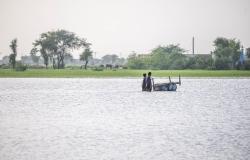Climate Activism in the Global South: A Call for Clear Agendas

Shafiq Ahmad Kamboh and Muhammad Ittefaq discuss climate activism in the Global South, highlighting the need for advocating eco-friendly agri-livestock practices and cleaner energy alternatives to policymakers. They also urge activists to monitor the functioning of the global Loss and Damage Fund to address climate justice issues.
Climate Activism in the Global North and South
Amid the global climate crisis, climate activism expands beyond traditionally high-emitting nations to include low-carbon footprint countries. While climate movements gain traction in the Global South, questions arise about the relevance of Western-centric agendas. This analysis underscores the need for a clear agenda in low-emitting countries (LECs), addressing specific demands for indigenous governments. It proposes actions for LEC activists, such as advocating for eco-friendly agri-livestock practices and cleaner energy alternatives. It emphasizes scrutinizing political party manifestoes in election years across LECs and urges activists to monitor the functioning of the global Loss and Damage Fund (L&D) Fund to address climate justice issues.
Amid the escalating global climate crisis, the momentum of climate movements has transcended borders, now resonating even in nations with historically low carbon footprints, a testament to the interconnectedness of global challenges. The main goal of these movements, i.e., generating climate activism, predominantly championed by Western societies, is gradually taking root in the Global South as well. However, this expansion raises pertinent questions about the kind of climate activism needed in low-emitting countries that often find themselves on the periphery of the climate change debate, owing to their low reliance on fossil fuels.
To introduce newcomers, particularly those in the Global South, the term “climate movement” refers to a worldwide social initiative dedicated to exerting pressure on governments and industries, compelling them to act against the profound dependence of the global economy on fossil fuels and the consequential severe impacts of climate change.
Many of these movements, including Friday for Future, Earth Strike, Extinction Rebellion, Just Stop Oil, and Ende Gelände, are led by dedicated climate activists. Their objective is to ignite widespread activism, gathering support from climate scientists, journalists, and students—all united in their call for bold and immediate measures to significantly reduce greenhouse gas (GHG) emissions.
Climate activism offers a range of nonviolent activities to impact policy decisions, including organizing and participating in public rallies, attending marches dedicated to climate change, speaking at city council meetings, signing petitions, and advocating for climate action on social and news media. While certain disruptive climate activities have gained support from experts, it’s essential to note that violent disruptive tactics face considerable public disapproval and criticism.
Though there are many objectives of these movements, from local grassroots strategies to nationwide campaigns, climate activists — many of them young people — are predominantly demanding that politicians and polluters step up the fight against climate change, by reducing GHG emissions from fossil fuels. Given that most GHGs are emitted by Global Northern countries due to their heavy reliance on fossil fuels, these movements tend to be Western-centric.
However, similar movements are emerging in the Global South. As these movements gain momentum it is important for activists and policy leaders in the Global North to learn from these movements and better support their efforts. It is also important for movements in the Global South to learn from the successes and failures of Western-centric movements and adapt their advocacy to the unique circumstances faced in the Global South.
Layers of Emitting Countries in the Global South
The inconsistency between larger GHG emissions from the Global North and the graver burden of extreme heat in the Global South has been a prime focus of the climate justice campaign. Advocates of climate justice argue that consumers of fossil fuels in the Global North significantly contribute to global GHGs, strengthening their economies, while the masses in the Global South bear the brunt of emissions from Northern countries without reaping corresponding benefits. Interestingly, research indicates that, akin to the Global North, emissions in the Global South are also concentrated, with India and China alone responsible for approximately 60%, and the top 10 countries contributing to about 78% of the group’s emissions. In contrast, around 120 countries make up only 22%.
Without highlighting such differences, it makes little sense to use the term “Global South”. Its members are affected differently and contribute differently to global climate change. In essence, the Global South comprises two layers of emitting countries: high-emitting countries (HECs) and LECs. This prompts the question of what kind of climate activism should be promoted in LECs, where GHG emissions are nearly negligible.
A textual analysis of a climate protest in a LEC of the Global South reveals that local activists are clear about the “international target” of their campaign, pressuring governments of high-emitting countries (both in the Global North and South) to reduce their emissions. However, unlike activists in HECs, they lack a clear agenda on GHG emissions for their governments, which have minimal reliance on fossil fuels. Consequently, they tend to focus on urging their politicians to implement climate adaptation measures, including accelerating tree plantation campaigns, imposing bans on plastic bag usage, and promoting electric vehicle policies, among other initiatives.
A Call for Clear Agendas in LECs
To address this gap, there is a need for a clear agenda for climate activism in LECs, specifying demands from their governments. This essay proposes several key areas for action.
While LECs generally have economies with less dependence on fossil fuels, many of these nations heavily rely on agriculture and livestock sectors. To address emissions of Methane (CH4) and Nitrous Oxide (N2O), climate activists in LECs—such as those in the Amazon region—should advocate for their governments to halt land use changes (LUCFs) associated with agricultural practices, thereby mitigating N2O emissions. Similarly, activists in Africa and South Asia should exert pressure on their governments to endorse and promote eco-friendly livestock farming practices, aimed at reducing CH4 emissions.
Activists in LECs should actively urge their governments to prohibit the installation of the dirtiest fossil energy power plants that heavily rely on coal to meet their increasing energy needs. It is essential for them to highlight the environmental repercussions and public health risks associated with coal-intensive power plants. Beyond merely opposing detrimental practices, activists can work toward shaping comprehensive energy policies that encourage the adoption of cleaner and more sustainable alternatives.
In 2024, which marks an election year in approximately 70 countries worldwide, encompassing LECs from Chad to Botswana and Bhutan to Pakistan, it is crucial for local activists to actively scrutinize political party manifestoes. These activists should exert pressure on political parties to transparently disclose their stance and agenda on climate-related issues. By closely monitoring the electoral platforms, activists aim to ensure that climate concerns are not overlooked and that political leaders are held accountable for their commitments to address environmental challenges.
Finally, it is essential to acknowledge that the establishment of a L&D Fund at COP28 represents a positive step toward climate justice, albeit insufficient. Wealthy nations have historically hesitated to establish such a fund, expressing concerns that it might pave the way for other claims, such as reparations for historical events like slavery. Activist movements in LECs should exert pressure on their respective governments to diligently monitor the progress of the L&D Fund and compel HECs to contribute to it. A tangible example of the impact of the absence of such a fund is evident in the case of the 2022 floods in Pakistan, declared by experts as a climate change-induced event, resulting in a staggering $30 billion in damages. Unfortunately, due to the lack of an L&D Fund, the people of Pakistan continue to bear the economic burden, grappling with a historical inflation rate to address the losses incurred by the floods.
Dr. Shafiq Ahmad Kamboh (Ph.D., Bremen University, Germany) is an Assistant Professor in the School of Communication Studies, University of the Punjab, Lahore, Pakistan. His research has been published in a wide range of academic journals, including Environmental Communication, International Journal of Communication, Journalism Studies, Psychology & Health, South Asia Research, Third World Quarterly, Local Environment, Analyses of Social Issues and Public Policy, Journal of Contingencies and Crisis Management, and Development Policy Review. X: @ShafiqAKamboh
Dr. Muhammad Ittefaq (Ph.D., University of Kansas, United States) is an Assistant Professor in the School of Communication Studies at James Madison University, Harrisonburg, United States. His research explores how individuals consume and engage with health and climate change information, including misinformation and disinformation. His research has been published in a wide range of academic journals, including International Journal of Communication, Journal of Health Communication, Health Communication, Environmental Communication, Journal of Science Communication, Journalism Studies, Convergence: The International Journal of Research into New Media Technologies, Vaccine, Digital Health, Psychology & Health, Third World Quarterly, Local Environment, and Analyses of Social Issues and Public Policy. X: @IttefaqM
Photo by Kafeel Ahmed


